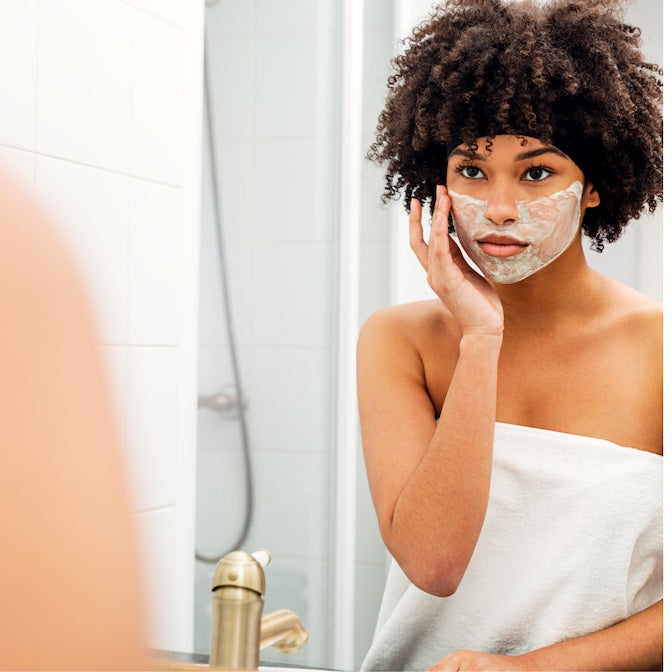Is your skin purging or breaking out?

Hey everyone! Let's talk about an age-long skincare debacle that has been weighing on my mind recently. Skin purge vs skin breakout. Is there a difference between the two? Are they one and the same thing but used interchangeably? Personally, I have used these terms interchangeably without realizing the inherent differences but today, we will try to do justice to these terms.
Every spot, (purge or breakout) has its roots coming from deep down in the skin, you know that place that is not visible to the naked eye. "Most spots are caused by too much oil or sebum production from the sebaceous glands found in either oily skin or dry skin; the oil then mixes with dead skin cells and gets trapped in the skin pores," explains consultant dermatologist Dr Justine Kluk . "The bacteria that causes spots to grow vigorously on the oil and dead skin mixture then activates the immune system, which triggers a cascade of inflammation that results in blemishes.
Let's dive a little deeper into what these two processes entails.
SKIN PURGE
According to Dr. Elizabeth Houshmand, "Skin purging is an inflammation where blackheads, pimples, and whiteheads, are raised to the surface of the skin from underneath after using a skincare product that speeds up the skin's cellular turnover rate," The dichotomy between skin that is purging and skin that is breaking out essentially, they have more or less the same result, visibly that is.
When your skin is working to adjust to newly introduced ingredients in new products, it starts to "purge" or clean out what is trapped in your pores, bringing those impurities to the surface of the skin. This expulsion usually leads to mild acne. However, the acne is temporary and usually clears up once dirt, and dead skin layers are removed from the skin's surface.
Say you start using a skincare product that is composed of an ingredient that enables cellular surface turnover. If pimples abruptly show up, it could be that your healthy skin is basically adjusting to the turnover. In line with Dr. Dendy Engelman's submission, "A pimple doesn't begin when you see it. It begins as a clogged pore under the surface of the skin. If a particular product you use during your skin care routine boosts up the rate at which the skin is being renewed, this will speed up the entire cycle, so you may see a flood of pimples appear." This type of acne shouldn't persist forever and usually clears up after constant use of the said ingredient. The adaptation period can take some time, so if you're using a skincare product with an element known to help boost surface cellular turnover like salicylic acid, glycolic acid, or even hyaluronic acid and you experience more pimples than usual, it may be worth sticking with it for a few months to get the full benefits.
SKIN BREAKOUTS
Skin breakouts are one subject matter that defies a universally acceptable definition. Generally speaking, it's used as a generic term for various types of acne flares that may occur when your skin is reacting because it’s sensitive to something in the product. It could be clogging your pores, or causing an allergy, or just some plain old irritation. Continuing with the product will just make the situation worse. There exist many kinds of breakouts that one can experience. There's blackhead acne, which are tiny raised black dots caused by clogged pores; the whitehead acne is also caused by clogged pores but appear as little white or flesh-colored bumps. Papule acne, which are small and hard, and often appear as red spots when surplus bacteria, oil, and dead skin cells push deeper into the skin and cause inflammation; pustule acne, which is pus-filled pimples; cystic acne, the most serious type that develops when cysts form deep underneath your skin. And lastly, hormonal acne which occurs when you experience a pimple or pimples during or right before your period. It is noteworthy that all of these breakouts need to be handled in different ways.
DIFFERENTIATION
Differentiating between skincare issues isn't the most straightforward task; however, experts seem to agree that when your skin purges, it is more likely due to ingredients throwing up already clogged pores to the surface of your skin. While a breakout may be an adverse reaction to a new skincare product.
Another differentiating line is the location of either a purge or a breakout. A breakout often appears randomly and individually, while a purge usually occurs over a large area. You can determine the difference between both skin maladies by assessing the appearance and your skincare routine.
Consultant dermatologist Dr. Justine Kluk opined that "In recent times, If you have added a new medicated treatment into your skincare routine and you experience more blemishes or blackheads in the weeks after that, this may probably be due to purging, and it will hopefully pass pretty soon. However, if you have started a new skincare routine (non-medicated) or introduced new makeup and your skin is breaking out, this could just mean that the items are not suitable for your skin and are aggravating the underlying acne process."

THINGS TO DO
Once you've noticed your skin is undergoing the purging process, it is paramount to stick to a routine like using facial cleansers on your face daily, albeit a gentle one. Consider the following when attending to your skin during a purging episode:
Keep your fingers away from picking at any pimples or bumps. While this could be irresistible, back off to prevent further soreness and discoloration. If you have multiple face products in your skincare regimen and use them almost at the same time, try to apply them at different times or switch to products with easy-to-layer textures.
In your facial care or skincare routine, avoid any facial products that may cause skin dryness especially if you have sensitive skin. Ensure your skin stays hydrated with the use of serums and moisturizers. Initiate a gentle cleansing regimen, and protect your skin from the sun.
As with all things with a medical undertone, when all else fails, seek professional medical help. Consult a certified dermatologist, who will analyze your skin type, concerns, and then provide a broad range of options to help out.

Leave a comment